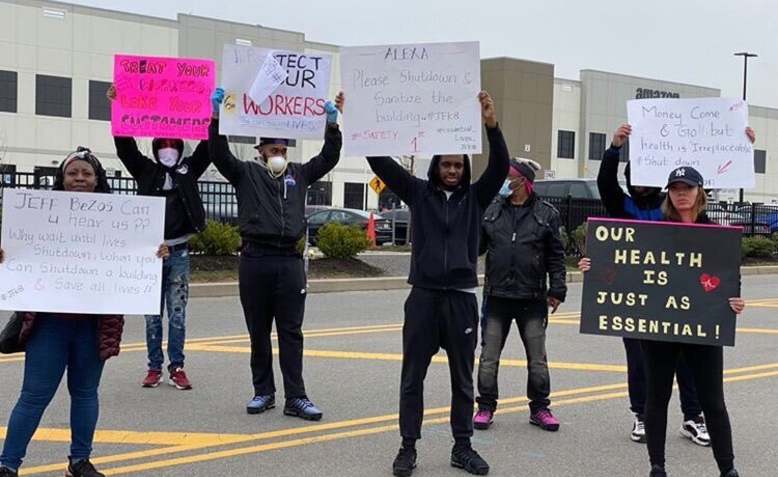 Amazon workers strike over unsafe conditions. Photo: Twitter/Chris Smalls (@Shut_downAmazon)
Amazon workers strike over unsafe conditions. Photo: Twitter/Chris Smalls (@Shut_downAmazon)
As employers exploit and neglect workers during the coronavirus crisis, Dave offers a practical guide to organising in your workplace now
This crisis has made many workers wish they had a union, and many that do decide to join. However, unions need to be a lot more than a place for good advice and individual support. Especially if we want to use our potential collective strength to protect us all from the virus now.
We also need to prepare for the aftermath. Experience from 2008 tells us all that Johnson’s government will expect us to both foot the huge bill, and pay for the effects of the recession which others have warned us of for some time.
There have been many critiques of the failings of our governments and lists of good demands we can place on them. However, perhaps most importantly is what each and every one of us do on a practical and personal level, in small ways, to prepare for the aftermath.
Whatever we do now should initially be about improving our immediate situation, and that of our colleagues at work, our neighbours in our communities, and of course our friends and families.
If we do this successfully, we will also strengthen our unions, and in turn our communities, and so be in a far better place to ensure that the positive feelings around the NHS, the idea of community, and the idea of dealing with society’s issues collectively remain when Johnson says its time for us to pay the bill.
So – what should you do if you’re in a unionised workplace and are a member?
1Contact the rep and say “I’ll help set up a WhatsApp group for union members her so we can act like a union even though we can’t meet.”
(If there’s not a rep, become the rep – some unions have interim reps until there can be a proper election. Just contact your union by email/internet. Their staff will be working.)
2Discuss any issues you have to do with you working conditions and any changes made due to the Covid-19 crisis. It could be social distancing (not being able to keep 2m apart). If you’re working with/near the public, have you got masks/gloves/sanitising gel. Is there proper support for homeworking? Are vulnerable staff pressurised to come in? Is anybody pressured to come in when there’s no need? Is there proper support for people with any mental health issues, or struggling to support their families? Only you and your colleagues will know what the issues are.
3Make sure you have the majority of the membership behind you, and are prepared to sign a petition to managers to that effect.
Use zoom or other free video conferencing platforms to enable face to face and group discussions.
4Approach your line manager/management to get those issues resolved, being clear this is the wish of the majority.
5Organise a petition stating your demands with a majority signing. If you’re at work, this can be on paper, otherwise online.
6Tell management that the union will share the petition publicly via social media if they continue to endanger workers and the public’s health and safety.
7If your demands are ignored, share the petition and shame your employer online and in local media. Since Grenfell and Covid-19, the days of “health and safety red tape gone mad” are in the past. There is huge support for workers protecting themselves and the public from the virus. Employers know that.
8Finally, make everyone aware of current Health & Safety legislation which explains the circumstances enabling you to threaten to walk off the job if its dangerous without the drawn-out ballot procedures. (Obviously, what you can do here will be determined by whether the work is really essential)
Just make sure that you and your colleagues discuss each step you take, and that you have clear majority support.
Any win now, on any issue, will make your union a real living presence at your work and therefore put you in a good position to respond collectively to any attacks on us in the aftermath.
Jane McAlevey, a union organiser in the US writes good practical advice on how to organise in the Covid-19 crisis here and her book “No Short Cuts” is an invaluable practical guide if you can get hold of it. Jonathan Neale, another long-standing American activist writes passionately about health workers and the campaign for PPE and ventilators here.
Dave is in the Organising Team of a UK trade union, writing in a personal capacity.

